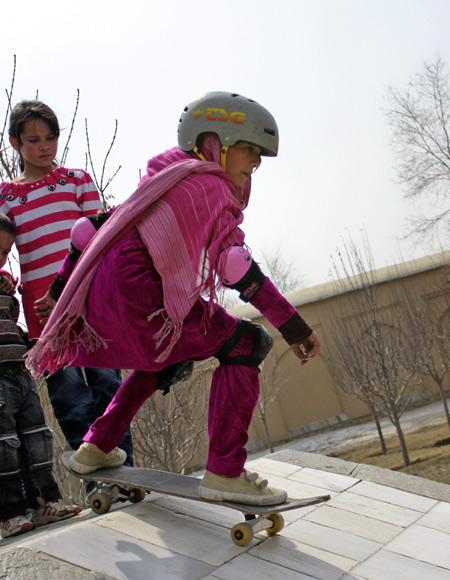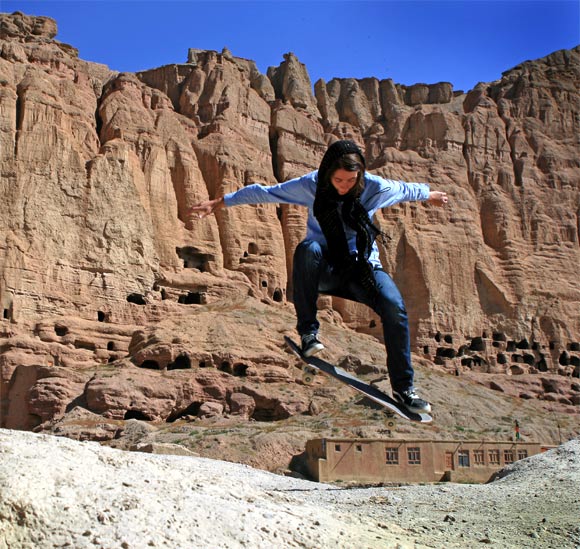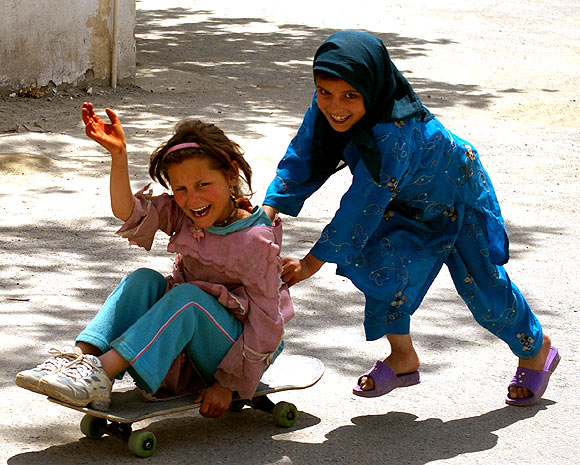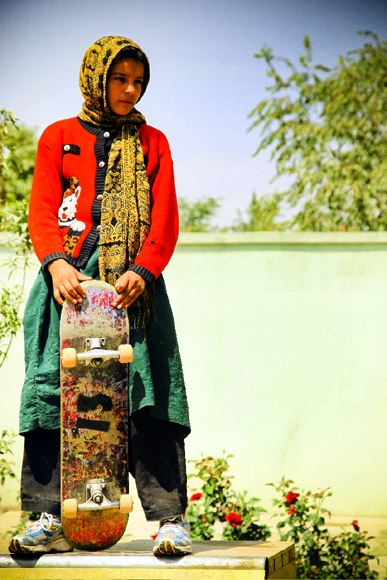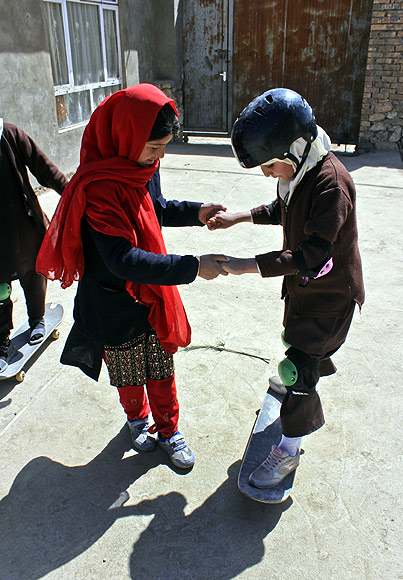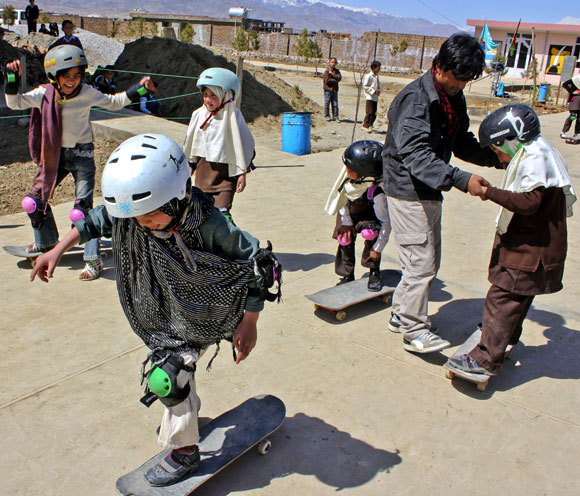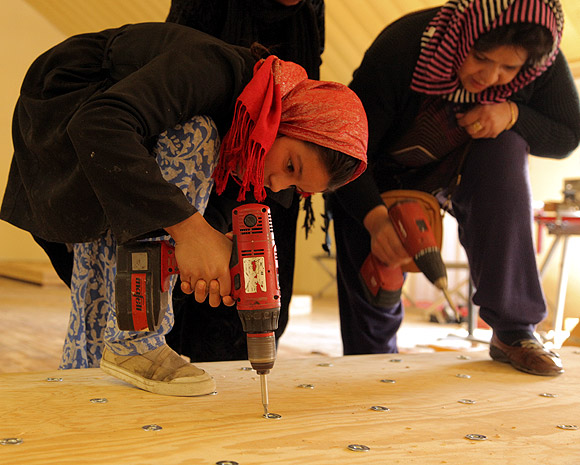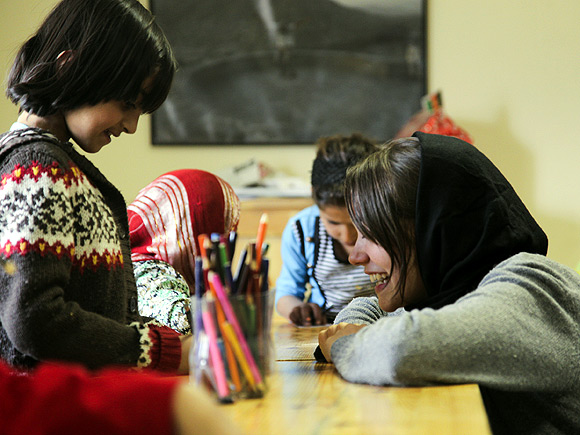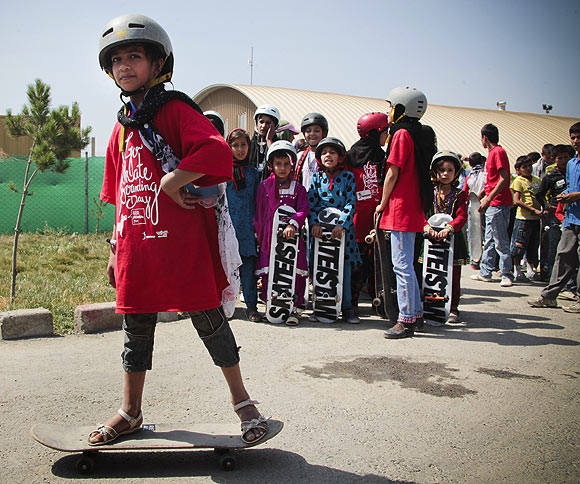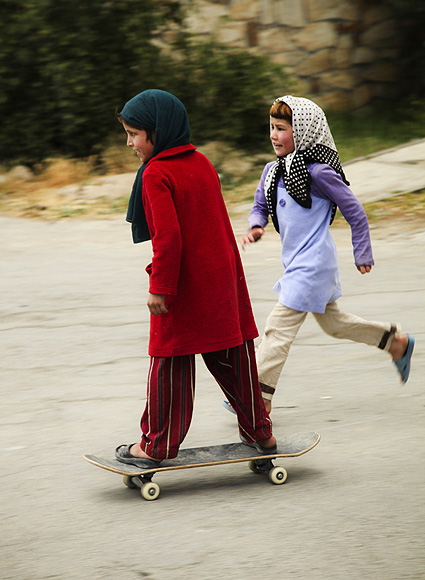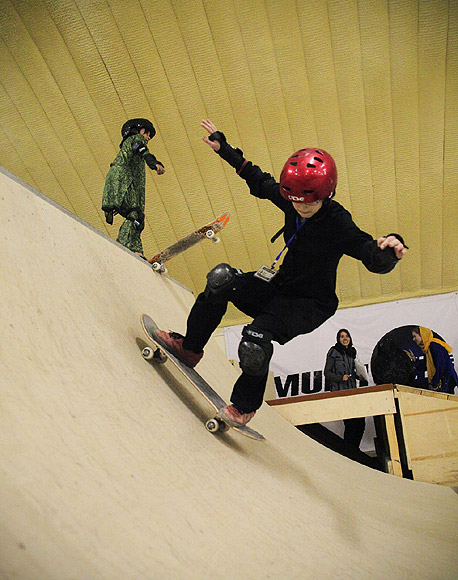 | « Back to article | Print this article |
On a roll: Skating adventures of Afghan girls
Rediff.com takes a look at the story of how the skateboard has helped break the long-standing social barriers and bridged the Afghan-Western divide. These captivating pictures tell the tale....
In Afghanistan, girls CAN'T ride a bike but they can ride a skateboard!
Australian Oliver Percovich came to Kabul impulsively in 2007 with, among other things, his skateboard, for his girlfriend at that time worked there. Unable to find a job, he killed time riding skates through the dusty and bumpy streets. The occasional bombings or military convoys that followed left him undeterred.
Click NEXT to read further...
Stunning photos: Afghan girls fly high on skates
He was quick in drawing the attention of the children. As he skateboarded, they watched. Intrigued they would often ask him, "What it was," pointing to the board. Some would reluctantly ask if they could give it a shot.
Percovich thought it was a great way to connect with Kabul's GenY and he did. Four years on, the sporting gear has become an epitome of empowerment.
Click NEXT to read further...
Stunning photos: Afghan girls fly high on skates
Scarves flying, girls sporting helmets and knee guards, are seen zipping through the streets and on skateboarding ramps. This was an unusual sight in conservative Afghanistan a few years ago, but not any more.
Percovich tapped the enthusiasm of the children. Through Skateistan, a non-profit initiative, he has connected youth and education through skateboarding in the war-torn nation.
Click NEXT to read further...
Stunning photos: Afghan girls fly high on skates
Among the skating enthusiasts 50 per cent work on the streets; many of them orphans. And while both boys and girls are hooked on to the sport, it's the fairer sex that has stolen the show. Nearly 40 per cent of Skateistan's students, aged between five to 18, are girls.
But the going is not easy for all Afghan girls. Many are confined to their homes, discouraged from public gatherings -- leave alone taking up a sport.
Click NEXT to read further...
Stunning photos: Afghan girls fly high on skates
Farnaza, who lost her father at a young age, found solace in the skateboard. She spent most of the day helping her mother, who earns a living for the family baking bread, doing household chores and taking care of her younger siblings. But, this girl dared to dream.
Along with a few of her friends she strolled into the skating park in Kabul in summer of 2010. "It was the best day of my life," she recalled.
"At first, I did not know how to even stand on a skateboard, but eventually I learnt with the help of a few teachers. Being a skater means a lot to me, especially because I am a girl," Farnaza said, as she narrated her story through a photojournalism project she took up in 2010.
Click NEXT to read further...
Stunning photos: Afghan girls fly high on skates
Farnaza, who was 13 then, had a few aspirations. While skating gave her that momentum, she did not want to stop at that. "I want to become a doctor or a teacher. With the money I earn, I can reach out to other children and help my family," she had said.
But her dreams were short-lived. An outgoing sister who was learning how to not only read and write, but also skate enraged her older brother. For him, it was a taboo and even their mother could not convince him to let Farnaza continue.
The family moved to a village in north Afghanistan and by January 2012, Farnaza was engaged.
Click NEXT to read further...
Stunning photos: Afghan girls fly high on skates
Millions of girls living the Afghanistan meet the same fate. But, Percovich brought in the 'wheels of change', literally. With the help of few liberal locals he made many families shed their inhibitions about the society's reaction, taking one baby step after another to mend Afghanistan's ethnic divide.
That girls from the conservative Islamic society must be veiled and cannot interact with men from outside the family is something he knew could not be altered. And hence separate classes for boys and girls were held when the country's first skateboarding school -- Skateistan -- started.
Click NEXT to read further...
Stunning photos: Afghan girls fly high on skates
A change was in the making. The numbers started swelling and the participation of girls was encouraging. From barely being able to balance themselves on the skateboard soon teenage girls were seen doing the flips and the ollies, an aerial trick.
And today the initiative has transformed lives of hundreds of Afghan girls.
Click NEXT to read further...
Stunning photos: Afghan girls fly high on skates
Fourteen-year-old Madina Saidy grew up on the streets; she sold trinkets to support her family. Today, she is a confident teen -- a youth leader at Skateistan, who teaches children coming from similar backgrounds.
"Through skateboarding I started dreaming again. Knowing that I can do something well and having teachers that support me helped me to believe in myself," said Madina.
Added Hanifa, another 14 year-old skater, "I always like to go high on the ramps. When I'm up there I feel free, like I'm flying."
Click NEXT to read further...
Stunning photos: Afghan girls fly high on skates
While Skateistan has provided a huge boost to children from the poorer strata, it also attracted those from educated families. Today, children of ministers are seen skating alongside their peers who work on the streets.
"It's very important to connect all children with each other," Percovich told BBC.
Click NEXT to read further...
Stunning photos: Afghan girls fly high on skates
Skateistan's aim is not restricted to skateboarding; it's simply the hook for engaging hard-to-reach children and teens. There is a two-hour session once per week where the students spend an hour each in the classroom and the skate park.
The students are provided with new opportunities in cross-cultural interaction, education, and personal empowerment programmes.
Click NEXT to read further...
Stunning photos: Afghan girls fly high on skates
"The students themselves decide what they want to learn -- be it creative art or multimedia. They get an opportunity to explore topics such as culture and traditions, health and peace," according to the Skateistan website.
Click NEXT to read further...
Stunning photos: Afghan girls fly high on skates
Four-year-old Skateistan is keen to grow and clearly has the potential. On May 23, a new skate park and education facility was opened in Mazar-e-Sharif, a city in northern Afghanistan. The new centre can accommodate about 1,000 students and at the same time a similar initiative has kick started in Cambodia.
Percovich's dream project has found support from professional athletes across the globe.
Click NEXT to read further...
Stunning photos: Afghan girls fly high on skates
"Skateistan is the epitome of what skating is all about. Raising awareness and providing that outlet is an incredible accomplishment. I honestly share in the excitement those kids feel," said Tony Hawk, an American professional skater.
Click NEXT to read further...
Stunning photos: Afghan girls fly high on skates
Twenty-eight-year-old Dutch professional skater Louisa Menke, who visited the Skateistan facility in Kabul to provide an impetus to the project, said, "'When I went to Afghanistan I had no idea what to expect, I couldn't imagine how it would be because I'd never been in a war zone before. When I arrived at the airport it felt like I had landed in a surrealistic world, into a beautiful country with beautiful people which had been taken over by war. Skateistan is a place that makes you forget about the war for a little bit."
True that! The flip tricks have provided these kids a diversion from their war-hardened lives. They believe they can fly!
TOP photo features of the week
Click on MORE to see another set of PHOTO features...
